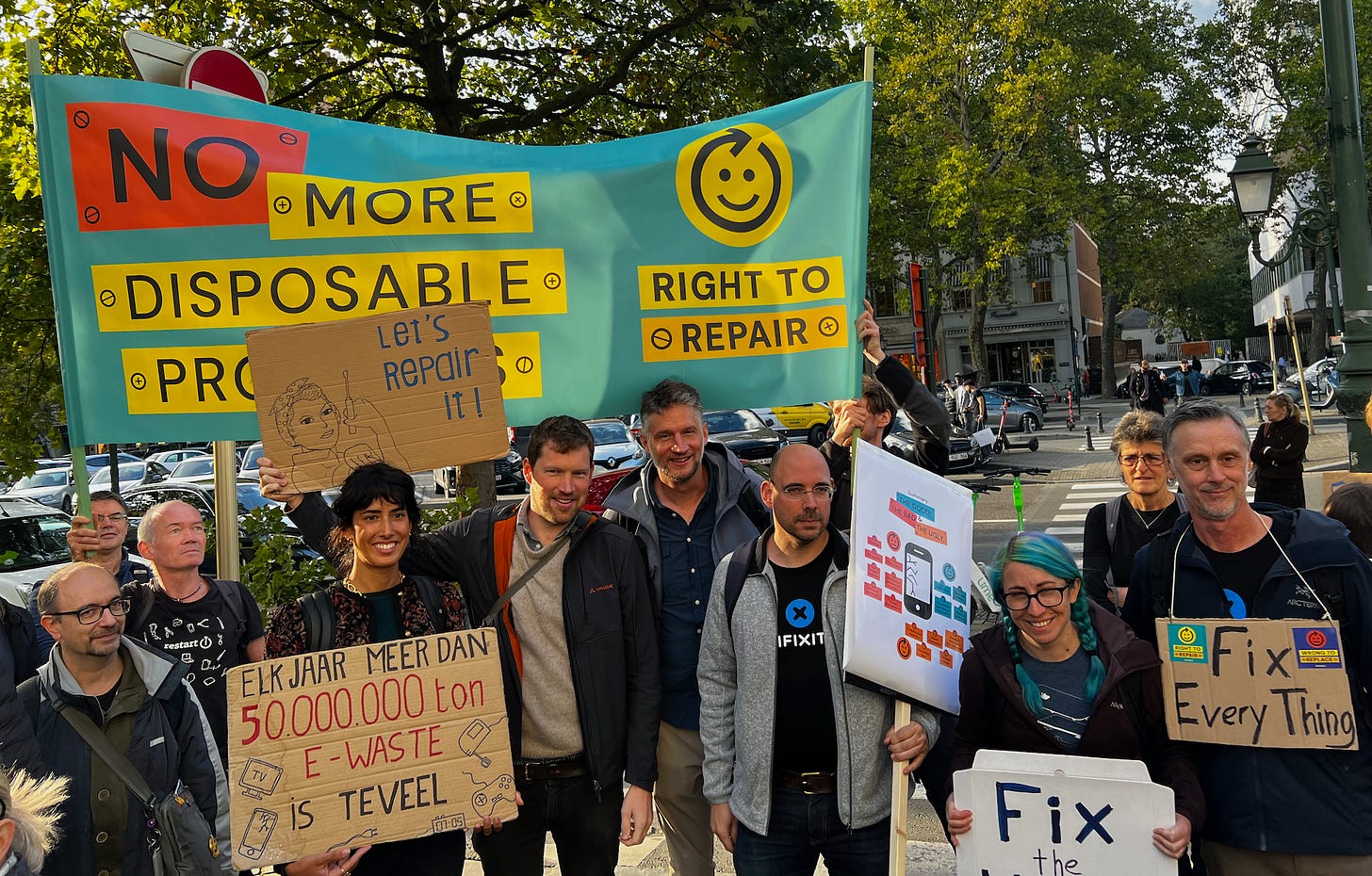Group calls out Deere for skirting GPL. Also: advocates pan EU right to repair rules.
Demands are coming for John Deere to comply with the General Public License (GPL) and share open source code it has modified. Plus: repair advocates pan proposed EU rules as timid.
Deere is ducking free software responsibilities
The Software Freedom Conservancy called out farm equipment manufacturer John Deere for failing to comply with its General Public License (GPL) obligations, preventing farmers from repairing tools essential for maintaining the food supply of millions.
As we have been doing privately for multiple years, we now publicly call on John Deere to immediately resolve all of its outstanding GPL violations, across all lines of its farm equipment, by providing complete source code, including "the scripts used to control compilation and installation of the executable" that the GPL and other copyleft licenses require, to the farmers and others who are entitled to it, by the licenses that Deere chose to use. (blog)
Copyrights and Copylefts
This standoff between Deere and its critics is part of a broader debate over “copyleft”. Copyleft is often used as a legal mechanism to ensure that software remains free and open to everyone, even as it is modified and distributed by others. However, even though Deere is utilizing GPL code, it is withholding its code under the auspices of its intellectual property rights.
The use of copyleft can serve as a defense mechanism against companies that seek to exert power over consumers through software. In today's world, software plays a significant role in the operation of various machines, including those that are critical to our daily lives— especially in agriculture.
When using code covered under the GPL license, users agree to share the program's source code with anyone who wants it. Following the letter of the license would mean that when an entity changes the program, they also have to share their changes back to the open source community. This way, the program can keep getting better and better as more people work on it.
But the opposite is true in the case of Deere, with critics accusing the equipment giant of withholding its modifications to the GPL code its applications rely on.
Source code-to-table
So why does source code matter for tractors? In this case, Deere wants to have its cake and eat it too: enjoying the benefits of using GPL-covered software, while ignoring the commitment to contribute modifications back to the open source community. (We won’t even mention the company’s refusal to give their customers access to the tools and software needed to repair their equipment).
In theory, Deere’s contributions to GPL-covered software, once properly returned to the open source community, could form the foundation of a new, free software alternatives to Deere’s draconian embedded software ecosystem. That, in turn, might birth a vibrant community of free and premium software and applications that could transform farming and greatly reduce the cost of operating and maintaining farm equipment.
Now that groups like The Software Freedom Conservancy are making noise and stepping up their pressure, it remains to be seen whether Deere will abide by its contractual obligations, or put up a (costly) fight.
Repair advocates pan EU’s timid repair proposal
Right to repair advocates are giving a “thumbs down” to a proposed EU right to repair law they say is far too timid, and far too friendly to manufacturers.
Once again, the opportunity to make the Right to Repair universal is missed. — The Right to Repair Coalition
The European Commission released its proposed “Rules Promoting the Repair of Goods” on Wednesday. The proposed guidelines contain some positive aspects. Those include the creation of a national online register for repairers and the creation of a harmonized EU system for estimating the cost of repair, according to an analysis by the Right to Repair coalition.

The laws are geared to encouraging repair and reuse over replacement of covered items, including household washing machines, tumble dryers, vacuum cleaners, dishwashers, and (eventually) smartphones and tablets. It does so by requiring manufacturers and sellers to conduct repairs when the cost of doing so is equal to- or less than the cost of replacing an item. It also requires manufacturers to provide a repair option beyond the warranty limit for the limited set of products covered.
On a number of other, burning issues that animate the right to repair movement, however, the proposed rules are silent. For example, the EU proposal makes no effort to crack down on anti-repair practices that reduce consumer choice and inflate the cost of repairs. Nor does it address the pricing of spare parts - which manufacturers often inflate the price of to encourage replacement versus repair.
Other News
Battery packs after accidents cannot be repaired or assessed, reports Reuters, forcing insurance companies to write them off, which leads to higher premiums and undermines the environmental benefits of going electric. The problem is exacerbated by the fact that battery packs can cost tens of thousands of dollars and represent up to 50% of an EV's price tag, and they are difficult to recycle or dispose of.
Medtech industry groups lose challenge on device repair - A federal judge in the District of Columbia last week dismissed a challenge from two medical technology industry groups to a rule that allows companies that repair medical devices such as MRI machines, CT scanners and defibrillators to sidestep copyright protections intended to limit access to software embedded in the equipment. The case challenged a rule, adopted by the Library of Congress in 2021, exempts companies hired by hospitals to service equipment containing manufacturers’ copyrighted software from the terms of the Digital Millennium Copyright Act (DMCA) a 1998 law enacted to combat digital piracy risks.
President Biden calls out right to repair on National Agriculture Day - “I have often said that capitalism without competition is not capitalism — it is exploitation. My Administration is working to promote fair competition across our economy, including in agriculture. We are encouraging antitrust agencies to focus on anti-competitive practices in agricultural markets. We are working to secure the so-called “right to repair” so farmers can fix their own machinery and tractors, rather than being required to send them back to the manufacturer. We are making it easier for farmers to bring claims against exploitative poultry processors, and the American Rescue Plan has invested $1 billion to help smaller meat processors expand operations.”
LG's caused controversy with its response to a customer complaint in Austrailia regarding a TV that had a failed display after only six months of use. The Australian Competition and Consumer Commission has regulations requiring customers have the right to request a repair, replacement, or refund.
The smartphone market is experiencing a decline in sales due to dampened consumer demand, inflation, and economic uncertainties. Lauren Goode at WIRED says while the form factor of the smartphone will continue to evolve, with better displays and foldable phones being introduced, she expects a stronger focus on software with features related to privacy and identifying fake news.
Are fast fashion companies using repair for greenwashing? While fashion giant Uniqlo is expanding is repair service to stores in the US, Primark is focusing on durability standards—making us wonder if whether these trends of fashion companies embracing repair are truly here to stay? A true adoption of repair in the fashion industry would have social and economic impacts for millions of laborers worldwide by curbing overproduction.
Farmers need mechanical, carpentry, and IT skills in today’s day and age, says 8th generation farmer Becky Nelson, but proprietary repair policies are threatening the livelihood of farmers. Nelson says it is crucial for farmers to stay informed, join organizations, and lobby for their interests when it comes to repair.
Big birthdays for pro-repair groups This year, 2023, marks the 10th anniversary of the Restart Project and Hackney Fixers. It is also the 20th anniversary of iFixit. Groups that have been battling for decades (literally) to give us all a right to repair and the capability to do it.
City of Boston seeks fixers for city-wide repair clinics The City of Boston is seeking volunteers who can help residents get small appliances and other items to working again, rather than simply tossing them in the trash. The Boston Public Library has a form up for folks who have experience fixing various small items, to serve as "fixit coaches" to help resident repairs one of several types of items: Bikes and skateboards, clothing and fabric, computers and phones, toys and wooden items, kitchen equipment, small electrical devices and jewelry.





